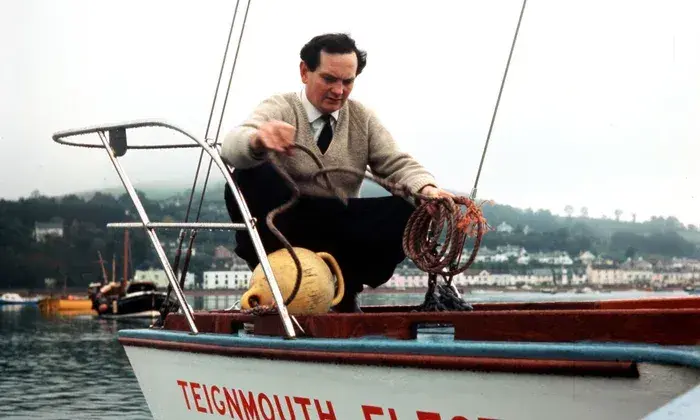(Image source: Paul Popper/Getty Images)
In 1968, a British newspaper announced one of the most ambitious competitions ever imagined: the Sunday Times Golden Globe Race — the first nonstop, solo circumnavigation of the world. There were to be no stops, no crew on the boat, and no assistance whatsoever. Just you, your boat, and 30,000 miles of open ocean.
Considering the obvious difficulty and risks involved, only nine people participated. One of them was Donald Crowhurst.
Crowhurst was not an obvious contender. He was an engineer and weekend sailor who had never attempted anything close to a global voyage. But he was charming and restless, and obsessed with the idea of greatness. His small electronics business was failing, and he saw the race as a once-in-a-lifetime chance to become someone famous.
His wife, Clare, begged him not to go. She knew neither he nor his boat was ready. But Crowhurst had already convinced himself that this adventure could rewrite his life story. He borrowed money, made reckless financial guarantees, and hastily outfitted an experimental trimaran that experts warned was nowhere near seaworthy.
On the day he set sail, he waved to cheering crowds with the confidence of a man who fully intended to return victorious. But only a few days into the sail, it became clear that he was out of his depth. The boat leaked. The equipment malfunctioned. He was far too inexperienced for the extreme conditions ahead.
So he made a decision that would define the rest of his life.
Instead of turning back, he stayed in the Atlantic and began faking his journey. He sent radio messages with fabricated coordinates, claiming record-breaking speeds. The logs in his diary were an elaborate fiction — pages of imaginary storms, progress, and triumph.
Meanwhile, the real front-runners were dropping out. Crowhurst had been keeping track of other sailors and was relaying his fake coordinates in such a way that he would come second, just behind the projected winner. This way, he would avoid the intense media scrutiny while still retaining the status of a hero. But the race leader dropped out in the final leg, and suddenly, Crowhurst’s fake trajectory put him on track to win.
And that’s when the panic set in.
Winning meant scrutiny. Scrutiny meant exposure. He would be unmasked not as a hero, but as a fraud.
Sometime in July 1969, alone in the vast Atlantic, Crowhurst seems to have understood there was no way out that allowed him to keep the image he’d created. His abandoned trimaran was later found drifting, intact, with his final logbook entries descending into despair and delusion.
Donald Crowhurst never made it back. And was never to be found.
He chased an image so hard, the image swallowed him whole.
~
Today, a similar dynamic plays out on our phones every single day.
In Crowhurst’s time, faking the journey meant sending fake coordinates, hoping his bluff would never be called. Today, that journey is faked through our feeds. The problem is, unlike in earlier generations, even people who might never have felt the urge to project status now find themselves caught in the mirror-of-others’-mirrors. Because when everyone else is posting images of luxury, success, jets and exotic travel, the pressure becomes more egalitarian
And this whole performance economy isn’t limited to influencers posing next to supercars they don’t own. It’s much more widespread — and far more personal.
Researchers studying Instagram behaviour found that the more people pretend online, the more they struggle offline. Those who present versions of themselves they know aren’t true tend to report higher levels of depression and a stronger, almost aching need for approval. The fake self isn’t just exhausting to maintain; it quietly eats away at you.
In India, you can actually see this pressure show up is in how people spend their money. In 2024, nearly 37% of all new consumer borrowing in India went toward smartphones and home appliances — a number that was just 1% four years ago. Think about that. More than one out of every three new loans today is essentially funding lifestyle signalling.
Zoom in further and you’ll find that about 40% of smartphones sold in India are bought on EMI. For premium phones, that number climbs to around 70%.
It’s reasonable to presume that most of these people buying on EMI are those who can’t afford to buy them outright. Most of them don’t need these expensive phones. They want them.
Earlier, they couldn’t do much about it. But now, this craving for status can be financed. Social media has catalyzed vanity, and the business ecosystem has incentivized it.
The need to impress others is draining — both mentally and financially. That’s why the following story is worth reflecting upon.
~
In the same race that pushed Donald Crowhurst toward illusion and despair, there was another sailor named Bernard Moitessier.
Where Crowhurst entered the Golden Globe Race dreaming of headlines, Moitessier entered it seeking nothing more than a long, uninterrupted conversation with the sea. He was already an expert sailor — a man who had crossed oceans the way others cross neighbourhoods. The competition was just an excuse to do more of what he loved.
As the 1968 race unfolded, Moitessier’s boat, the Joshua, moved with assured composure that only comes from decades of understanding the oceans. By the time he rounded Cape Horn, he was so far ahead that victory was almost guaranteed.
But the closer he came to the finish line in England, the heavier the thought of attention felt. News reports were full of anticipation. Crowds were preparing to welcome him. Sponsors and journalists were lining up. He was apprised of this buildup by the authorities back in England. To most, this would have been a dream.
To Moitessier, it felt like pollution.
He feared that the noise on land — the applause, the interviews, the sudden celebrity — would corrupt the very joy that brought him into the race in the first place. Sailing, to him, was a private happiness. A sacred space. Something that didn’t survive well under the spotlight.
So, late in the race, he did something that stunned everyone: he simply kept going. Instead of turning north toward glory, he pointed the Joshua east and sailed past Africa and the Indian Ocean toward Tahiti. No celebrations. No trophies. Just a message fired via slingshot to a passing ship: “I continue because I am happy at sea, and perhaps because I want to save my soul.”
In doing so, he accidentally set a new world record for the longest nonstop solo sail in history. He circumvented the world one and a half times in the process.
Moitessier represents the other extreme — a man so uninterested in status that he abandoned a win to preserve his inner compass.
I’m not sure we should aspire to vanish into the Pacific. But in a world obsessed with display, a little bit of his spirit — doing things quietly, for their own sake, without the need for applause — might be the only real antidote we have today.
The real victory may simply be choosing, a little more each day, to be Moitessier.
A question for you
Recall any significant moment in your life where you chased an image you didn’t need. Would you do it any differently today? Why?
Write to us at plainsight@wyzr.in. We’ll include the most insightful answer in next week’s edition. :)
What we’re reading at Wyzr
The Art of Spending Money by Morgan Housel. I read about the story of these two sailors in a chapter of this book. I’ve always loved his writing, and although he doesn’t make any new points, his storytelling always makes the read enjoyable.
Until next time,
Best,

